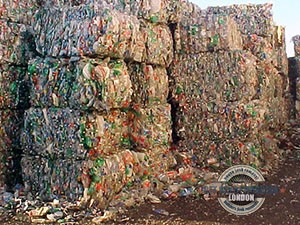Recycling i.e. the process of producing useful raw materials from junk and rubbish, and its outcome depends on a number of factors.
The first one is effective rubbish collection, in other words as much useful waste must be collected from households and businesses in order to generate a steady and sufficient supply of recyclable materials. Such are glass, metal, plastic, wood and paper etc.
The second factor is means of recycling/production – this means that a country has to have the necessary technical capacity (in the form of recycling depots and treatment plants) to process junk and rubbish into recyclates (the new raw materials). So rubbish collection is just the tip of the iceberg so to say.
The third factor is quality of derived recyclates. As mentioned above recyclates are the new materials produced through recycling of waste after rubbish collection. Obviously producing new, pure materials from waste is not as clear cut and simple as it seems. In most cases, rubbish has to be sorted or segregated after removal or collection in order to separate different recyclables from one another. This is quite necessary and evident as for instance glass recyclates cannot contain traces of plastics and vice versa.
The quality of recyclates is one of the key issues which must be addressed by countries which want their recycling program to be successful. A successful recycling program can be developed and elaborated later on in order to increase its effectiveness in the aim of achieving zero waste green economy. Recyclates quality depends on the purity of materials that go into its production. In technical terms, a good quality recyclate will contain only the target recycling material, or worse case only an insignificant amount of non-target materials.
Failing to produce quality recyclates may not seem like a big deal as they could indeed be used or processed through other means, but in many cases low quality recyclates are sent back to landfills – definitely not a good outcome after all the time, effort, energy and technology that went into producing these recyclates.
 From economic point of view, high quality recyclates (and recycling programs in general) actually create more economic value for the nation. How so? Simple – you make money from rubbish. First up, a well devised national junk removal and collection service ensures all waste is collected properly. Next up, effective recycling practices and good quality recyclates are no longer rubbish but useful raw materials. These can be used in the manufacturing of goods and items for domestic and industrial purposes. Since individuals and businesses do not have to spend as much on certain items and goods (as these are made of recycled materials) they have more money to spare, literally. If there are high turnover rates and the rubbish collection and processing sector of the economy is functioning well, then there are likely to be more investors and developers interested in that particular industry. Investment stimulates economic growth and increases natural prosperity, in this case through sustainability. So basically this is how recycling can bring added value to the economy.
From economic point of view, high quality recyclates (and recycling programs in general) actually create more economic value for the nation. How so? Simple – you make money from rubbish. First up, a well devised national junk removal and collection service ensures all waste is collected properly. Next up, effective recycling practices and good quality recyclates are no longer rubbish but useful raw materials. These can be used in the manufacturing of goods and items for domestic and industrial purposes. Since individuals and businesses do not have to spend as much on certain items and goods (as these are made of recycled materials) they have more money to spare, literally. If there are high turnover rates and the rubbish collection and processing sector of the economy is functioning well, then there are likely to be more investors and developers interested in that particular industry. Investment stimulates economic growth and increases natural prosperity, in this case through sustainability. So basically this is how recycling can bring added value to the economy.
